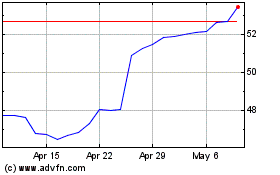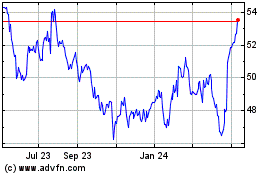Unilever Growth Slows on Competition in Emerging Markets -- 2nd Update
October 13 2016 - 4:05AM
Dow Jones News
By Saabira Chaudhuri
LONDON-- Unilever PLC Thursday reported a slowdown in
third-quarter revenue growth, as the world's second-largest
consumer goods company struggled with fierce competition in
emerging markets and the impact of currency devaluation in Latin
America.
The maker of Ben & Jerry's ice cream and Dove shampoo posted
third-quarter sales growth on an underlying basis--which strips out
the impact of acquisitions, disposals and exchange-rate changes--of
3.2%, down from 5.7% growth in the same period a year earlier.
Revenue climbed 3.4% at constant currency as the company offset
volume declines with higher prices. But including a negative
currency impact of 3.4%, revenue was flat at EUR13.4 billion ($14.8
billion). Profit figures weren't disclosed.
The results came as the Anglo-Dutch consumer goods giant has
been grappling with a slump in the pound following Britain's vote
to leave the European Union. Unilever's products were unavailable
on British grocer Tesco PLC's website as of Wednesday after
Unilever demanded Tesco raise prices and the grocer refused,
according to a person familiar with the standoff.
Chief Financial Officer Graeme Pitkethly in a Thursday interview
said pricing decisions are delegated to local markets, and that the
U.K. makes up about 5% of Unilever sales.
He declined to comment on when and on what terms the company
will restart supplies to Tesco, but said the company had seen a
EUR600 million rise in costs tied to currency devaluation and that
many of Unilever's products contain ingredients that are
internationally traded, such as plastics, flavors, fragrances and
tea.
Bernstein analyst Bruno Monteyne said the dispute between Tesco
and Unilever is "inevitable Brexit-induced price inflation," since
"a shampoo produced on the continent is now 17% more
expensive."
Unilever's negotiations with Tesco--Britain's largest
retailer--will no doubt set the tone for how prices rises are
passed along across the rest of the industry. Retailers are
unlikely to absorb the price increases, according to Mr. Monteyne,
meaning any cost increases passed along by Unilever will hit
consumers' pockets.
The world's second-largest consumer goods company after Procter
& Gamble has also approached J Sainsbury PLC--Britain's
second-largest supermarket chain--about raising prices by around
10% on average, according to a person familiar with those
conversations. Sainsbury is still in talks with Unilever.
Unilever's hedging arrangements typically protect the company
between four and six months ahead, meaning the company should start
to see the impact of cost increases later this month.
Unilever regularly both raises and cuts prices around the world,
according to Mr. Pitkethly. "It's always a combination of
underlying commodity movements and currency impacts," he said.
On an underlying basis, Unilever reported sales growth in
emerging markets weakened to 5.6% from 8.4% a year earlier.
Consumer demand in India was dampened by price increases on skin
cleaners while in China sales were down due to price competition in
laundry, according to the company.
Chief Executive Paul Polman described global markets as "soft
and volatile," in particular calling out currency devaluation in
Latin America as having squeezed disposable income.
Unilever has adopted so-called zero-base budgeting or justifying
each year's expenses from scratch to rein in costs as it works to
mitigate the impact of the turbulent macroeconomic environment.
In developed markets, underlying sales growth was flat compared
with a 2.1% rise a year earlier.
The company saw what it described as "high promotional
intensity" in Europe, hitting its home-care and personal-care
businesses. In the U.S., promotional activity in hair-care hurt
results, said Mr. Pitkethly.
Unilever has made a string of U.S.-focused acquisitions in
recent months that pit it squarely against rival Procter &
Gamble. Last month it agreed to buy Seventh Generation Inc., a
maker of plant-based detergents and household cleaners, and in July
it said it was buying Dollar Shave Club, an e-commerce business
that sells disposable razors and other grooming products.
Unilever has also been pushing deeper into personal-care
products such as shampoos and deodorants that appeal globally, and
away from slower-growing food brands.
But on Thursday the company said "intense competition" in many
of its markets had squeezed growth in its personal care arm.
Revenue climbed 3.1% on an underlying basis, which is half the
growth level in reported a year earlier.
The home-care and refreshments divisions performed better,
logging underlying sales growth of 3.9% and 4.5% respectively.
The food arm reported 1.7% growth, helped by cooking products in
emerging markets and organic dressings. But Unilever's spreads
business--which mainly consists of margarine--continued to decline
in both North America and Europe. The company has faced pressure
from analysts and investors to sell the declining business but has
so far refused, saying it hasn't received an acceptable offer.
Write to Saabira Chaudhuri at saabira.chaudhuri@wsj.com
(END) Dow Jones Newswires
October 13, 2016 03:50 ET (07:50 GMT)
Copyright (c) 2016 Dow Jones & Company, Inc.
Unilever (NYSE:UL)
Historical Stock Chart
From Mar 2024 to Apr 2024

Unilever (NYSE:UL)
Historical Stock Chart
From Apr 2023 to Apr 2024
